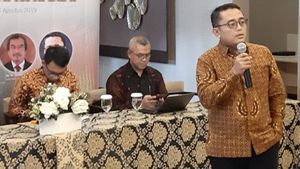JAKARTA – Even though the road is not very smooth, there are many ways to keep developing yourself. Here, a philosophy that was initiated in Japan after the 2nd World War can be a reference when you are stuck, a little lazy, or are overthinking which limits your steps.
Kaizen is an approach that emphasizes continuous improvement methods by emphasizing quality management, collaboration, and continuous improvement. This Japanese-style approach advocates change management as well as limiting risk.
When compared to progressive change, change in Kaizen tends to be slow but constant. This is a formidable challenge because the natural feeling of laziness always overshadows development, especially within oneself.
Kaizen comes from two words, namely kai and zen. Kai means 'change' and zen means 'better'. Taken together, the philosophical meaning of Kaizen is terminologically 'change for the better'.
Small steps are held in running Kaizen. The analogy is, no matter how small the waves still move the sailing ship.
Masaaki Imai's famous book published in 1986 entitled Kaizen: The Key to Japan's Competitive Success, was originally applied in the industrial sector. Especially lean manufacturing to regulate management with the slogan 'reduce waste and increase profits'.
Currently Kaizen can be applied in all industrial sectors, especially to improve company performance by involving all employees. Here collaboration takes place and change moves bit by bit.
Reported by The Minds Journal, Monday, May 31, the habit of always 'moving' can be done in a disciplined manner. According to psychology, a person who is mediocre will not achieve development.
Well, still according to psychology, habits can be built through a routine for 21 days so that when it reaches 90 days it becomes a permanent routine. Conceptually, there are 5 methods of breaking down limitations for self-development, namely as follows:
OrganizedDoing activities, such as completing work, without organizing one by one will not be completed according to the deadline. This means that keeping all tasks organized will make the process easier and more specific in exploring what is really needed.
Make sizeHaving measures is useful for evaluating specific things after doing what needs to be done. This means that every activity is quantitative, can be measured.
CompareMeasures that have been made previously are used for comparison, their function is to measure success. By comparison, you can also negotiate about which way is right and which one needs to be abandoned.
InnovateThe previous methods gave birth to innovation because they were constantly looking for new ways and new developments for both themselves and the company.
over and overThis last method is to shape development as a continuous step and reorganize or return to the first principle. That everything that is organized will be easier to measure, find equivalents or comparisons, and give birth to innovation.
Is there anything stopping you from developing yourself? If you feel lazy, afraid of failure, frustration, and sudden changes are out of control, then try the first step, which is to respond to waves even with small but constant movements.
The English, Chinese, Japanese, Arabic, and French versions are automatically generated by the AI. So there may still be inaccuracies in translating, please always see Indonesian as our main language. (system supported by DigitalSiber.id)













